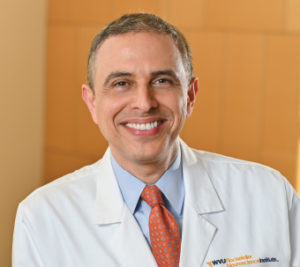Assoc. Dean & Vice President of Neuroscience; John D. Rockefeller IV Chair in Neuroscience; & Executive Chair of the Rockefeller Neuroscience Institute, WVU
By Emily Rice
Ali Rezai, M.D., is making history in the Mountain State with his groundbreaking procedures targeting ailments with different methods from different perspectives.
Rezai earned his undergraduate degree from the University of California and his medical degree from the University of Southern California. He completed his neurosurgery training at New York University and a subspecialty fellowship in functional neurosurgery at the University of Toronto.
“Early in my medical school studies, I became fascinated by the human brain, its complexity and how it oversees all aspects of our lives and our overall health,” Rezai says. “There was so much we still did not understand about the brain, and it is still amazing to me that there is so much we don’t know about the brain. There are more than 100 million people in the U.S. and 1 billion worldwide affected by brain and nervous system conditions, such as Alzheimer’s disease, Parkinson’s disease, Huntington’s, ALS, multiple sclerosis and brain tumors, many of which we don’t understand and can’t predict, treat or cure.”
Rezai was recruited to West Virginia University (WVU) in 2017 to build and lead the new Rockefeller Neuroscience Institute (RNI), a world-class patient care and research hub in the heart of Appalachia.
“In just four years, we have developed one of the most innovative institutes and forward-thinking teams in the U.S., which is making a difference for those with neurological and mental health disorders right in the heart of Appalachia in West Virginia,” Rezai says. “We have created an environment that fosters cutting-edge care, compassion, creativity and curiosity coupled with boldness and determination to make a difference. I am incredibly grateful to our dedicated team of experts; Gordon Gee, Clay Marsh and Albert Wright for their leadership and partnership; and to our supporters who have made our work possible.”
Today, Rezai is the John D. Rockefeller IV chair in neuroscience, executive chair of the RNI and associate dean and vice president of neuroscience at WVU.
“The institute has over 1,300 dedicated team members and 200 physicians and scientists who, together, are deeply rooted with a common purpose and passion,” Rezai says. “The RNI strives to advance brain health and patient care, to break barriers and seek cures for the incurable. The courage of our patients and their families continues to inspire our team and motivates us to further seek breakthroughs in science and treatment.”
The RNI team in neurology, neurosurgery and behavioral medicine sees over 220,000 patients annually in Morgantown and at 10 other hospitals, 19 outpatient clinics and over 50 telemedicine locations across West Virginia, Pennsylvania, Ohio and Maryland. Patients from 49 states come to the RNI for their neurological and mental health care.
“Our team provides the most advanced, compassionate and holistic care that focuses on the needs of each individual person, helping with their physical, emotional and cognitive health and wellness in a coordinated fashion,” Rezai says.
Rezai has had the opportunity to learn and work with some of the pioneers in neurosurgery, but he says some of his greatest mentors have been his patients.
“Many of these patients have severe, intractable conditions and disabilities that have progressively taken away their quality of life, independence and occupational and social functioning,” Rezai says. “Despite these adversities, they are courageous and do not give up in their quest to seek ways of getting better.”
While Rezai may have been recruited to the Mountain State, he was drawn to the passion, dedication and can-do attitude of the people.
“The visionary leadership here at WVU is committed to creating world-class patient care programs and an innovative neuroscience research hub in the heart of Appalachia,” Rezai says. “I am excited about the future potential of what can be done in West Virginia.”
While he has received innovation awards, patient care awards, teaching awards and was even named the Innovator of the Year from Cleveland Clinic and Ohio State University, Rezai says success begins with helping one person at a time.
“Success is the teamwork that we have organized with close partnership to advance population health and wellness and neurological and mental health care management,” Rezai says.
Cutting-Edge Treatments in West Virginia
For Ali Rezai, M.D., the blood brain barrier (BBB) presents a significant challenge for treating brain disorders.
Preclinical studies have shown that magnetic resonance-guided low-intensity focused ultrasound can reversibly open the BBB and facilitate delivery of targeted brain therapeutics.
“At the Rockefeller Neuroscience Institute (RNI), our team uses the latest technologies to develop new treatment options for patients in West Virginia and nationwide,” Rezai says. “One example is focused ultrasound for treatment of tremors and Parkinson’s disease. Focused ultrasound is a non-surgical outpatient procedure where we direct over 1,000 ultrasound beams to a pinpoint area in the brain to stop the tremors. The results are instantaneous, and patients are able to go home within a few hours after the procedure.”
Seeing patients regain their function and quality of life is highly gratifying for Rezai and the team.
“I am excited by the opportunity of our West Virginia team being on the cutting edge of innovation with first in the U.S. clinical trials,” Rezai says. “There is an urgency to help people and their families impacted by neurological and mental health conditions and to save lives. This is what motivates me and our team to work hard and make a difference to save more lives, improve patient care, advance neuroscience discoveries, improve quality of life and reduce the burden of disease. Our hope is that one day soon someone can declare, ‘I am an Alzheimer’s or a Parkinson’s survivor.’”




